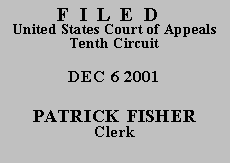

| SARAH WHITTIER BROWN, | No. 01-2210
(D.C. No. CIV-01-157-LH/DJS) (D. N.M.) |
Ms. Brown brought claims under the Full Faith and Credit Clause, Due Process Clause, and the Equal Protection Clause in an attempt to collaterally impeach her divorce decree issued from a District of Columbia Superior Court in 1973.(1) She claims that the divorce is legally void because she was undergoing psychiatric treatment in Malta during the time of the divorce proceedings and had no knowledge of or input into the proceedings. The district court analyzed these constitutional claims as if they had been brought pursuant to 42 U.S.C. § 1983 and applied the statute of limitations applicable to such claims.
State statute of limitations for personal injury claims provide the limitations period for § 1983 claims, Beck v. City of Muskogee Police Department, 195 F.3d 553, 557 (10th Cir. 1999), and the district court found that the District of Columbia has a three-year residual statute of limitations for such claims. Federal law, however, governs the time for the accrual of § 1983 claims, which this court has determined to be "when the plaintiff knows or should know that his or her constitutional rights have been violated." Smith v. City of Enid ex rel. Enid City Commission, 149 F.3d 1151, 1154 (10th Cir. 1998). Although Ms. Brown did not inform the district court of when she became aware of the divorce, the court found it "incredible" that such knowledge did not accrue until twenty-four years(2) after the judgment was entered. (Dist. Ct. Order at 3.)
On appeal, Ms. Brown apparently pursues an argument that the statute of limitations should be tolled because she suffers from a mental disability. It is unclear from the record whether she presented this argument below, but even assuming that she did, she has only provided the court with conclusory statements about her mental disability. The only relevant facts which she has alleged are that she is presently classified as a "Disabled Individual" and "mentally incompetent" by the Social Security Administration and that her hospitalization overseas was terminated on June 27, 1974. (ROA, Doc. 10 at 4-5). She has not alleged that she has suffered from a mental disability from the time of her divorce until the present, nor is there evidence in the record of the nature or severity of her disability. In short, she has not alleged that the statute of limitations was tolled for a long enough period so that she has time remaining to pursue a claim challenging the 1973 divorce. Without such a showing to the district court, presumably, nor to this court, we conclude that the district court did not err in dismissing her claims under Rule 12 (b)(6) for failure to state a claim. Accordingly, the decision of the district court is AFFIRMED.
ENTERED FOR THE COURT
David M. Ebel
Circuit Judge
*.After examining appellant's brief and the appellate record, this panel has determined unanimously that oral argument would not materially assist the determination of this appeal. See Fed. R. App. P. 34(a)(2) and 10th Cir. R. 34.1(G). The case is therefore ordered submitted without oral argument. This Order and Judgment is not binding precedent, except under the doctrines of law of the case, res judicata, and collateral estoppel. The court generally disfavors the citation of orders and judgments; nevertheless, an order and judgment may be cited under the terms and conditions of 10th Cir. R. 36.3.
1. The court notes that Ms. Brown has made other attempts in this court to have the 1973 divorce declared void. See Brown v. District of Columbia, No. 96-2238, 1997 WL 235065 (10th Cir. May 8, 1997) (claim dismissed for lack of subject matter jurisdiction). She also has filed three similar actions in the District of Columbia Circuit. See Brown v. Koenick, No. 96-5296, 1997 WL 150101 (D.C. Cir. Feb. 27, 1997); Brown v. Koenick, No. 95-5260, 1995 WL 791569 (D.C. Cir. Dec. 7, 1995); Brown v. Brown, No. 94-5025, 1994 WL 315346 (D.C. Cir. Jun. 15, 1994).
2. The district court did not articulate when it thought Ms. Brown's claim accrued, but it is apparent from her similar actions in the District of Columbia Circuit dating back to 1994 that she was aware of her divorce at least by the early 1990's.